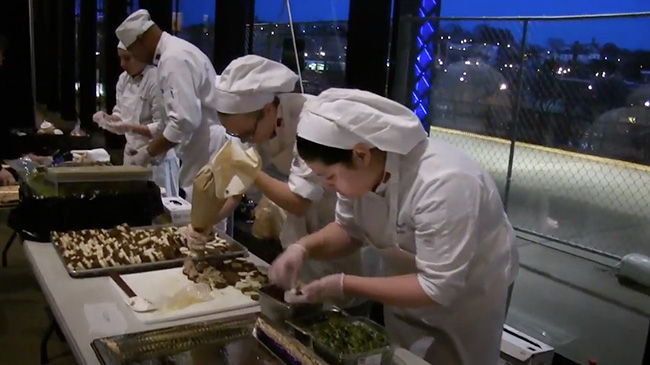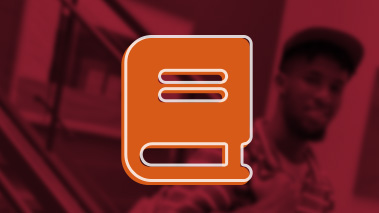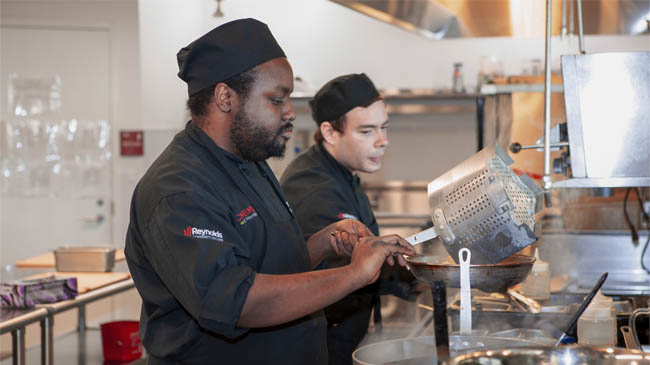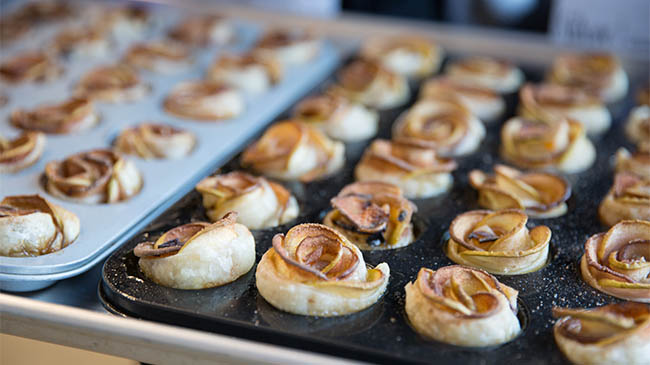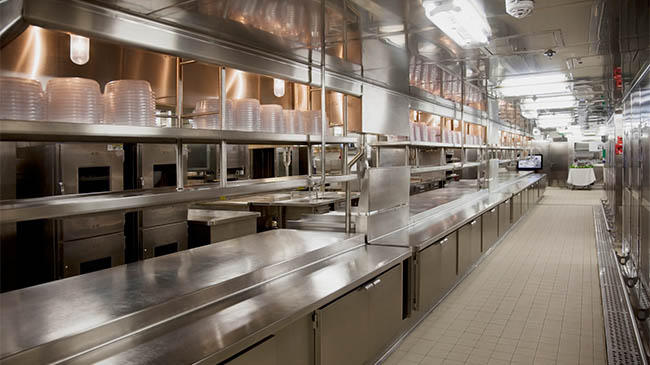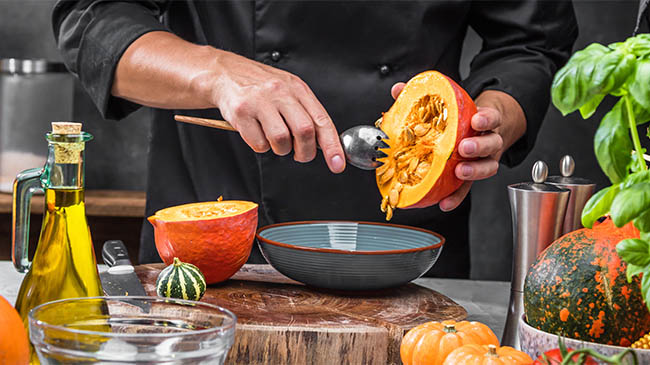Foundations of Culinary Technique
- Career Studies Certificate (C.S.C.)
Program Snapshot
Your Learning Options
In-Person
19 Credit Hours
Estimated Time to Complete
1 year (2 full-time semesters)
In-State Tuition Per Credit Hour
$176.00 | Calculate your costs
Why Foundations of Culinary Technique?
Unlock your passion for the culinary art and unleash your potential for to success in the vibrant culinary industry.
- Gain essential skills and knowledge needed to excel in professional kitchens, creating opportunities for career progression.
- Benefit from state-of-the-art facilities equipped with the latest culinary tools and technology, that prepares you for real-world challenges in the kitchen.
- Receive personalized attention as you hone your skills under the guidance of experienced culinary professionals, committed to helping you achieve your goals.
Program Roadmap
Get all the details on our Foundations of Culinary Technique program, including class sequences, admission requirements, financial considerations, and more.
Paying for College
We are committed to using all of the available funds to help you gain access to a college education. In fact, more than 91% of our students graduate without any educational debt. In 2023, Reynolds Community College students received over $21 million dollars in grants, loans, work-study and scholarships with the average aid awarded totaling over $4,000 per student.
Payment plans are offered to break down tuition payments. Textbook Assistance and Laptop Lending Programs are also available. Be sure to explore all the types of financial aid available as well!


Get a Skill. Get a Job. Get Ahead.
G3 financial assistance at Reynolds can help cover tuition for select programs like this one! Starting something new or changing a career path can be scary, but if you want to earn workplace certifications or an academic degree that leads to a career, G3 tuition assistance can help remove the financial barrier of going to college.
Why Reynolds?
We are more than a community college.
Reynolds is the key that unlocks the door to your academic and professional success. Here you will find a safe place to start. We will help you explore, dream, succeed, try, and try again. Our amazing faculty and highly personalized advisors, your Reynolds Navigators, are well known for guiding you to discover that "aha moment.” That means an outstanding college experience, less debt, more freedom, and a solid start on your future.
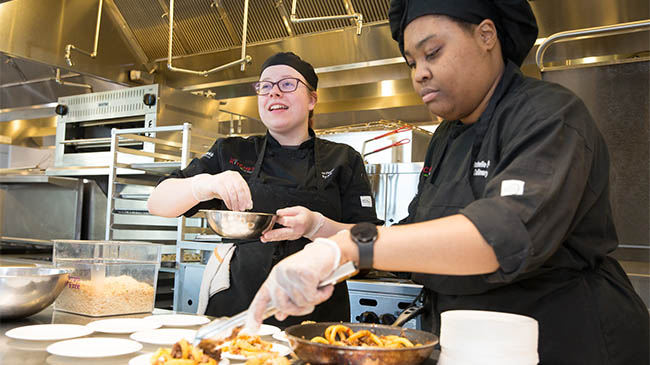
Experience small lab courses and hands-on practice right from the first semester. Our curriculum emphasizes practical learning, allowing you to apply theory in real kitchen settings and develop the confidence and proficiency needed to succeed in the culinary industry.
The culinary industry is the largest in the world, serving every single person daily. With national growth in the sector exceeding 10%, there are increased positions, wages, benefits, and diverse schedule designs and opportunities awaiting you. Benefit from our network of over 100 businesses in the Richmond Metro Region, providing ample internship opportunities and skill growth development.
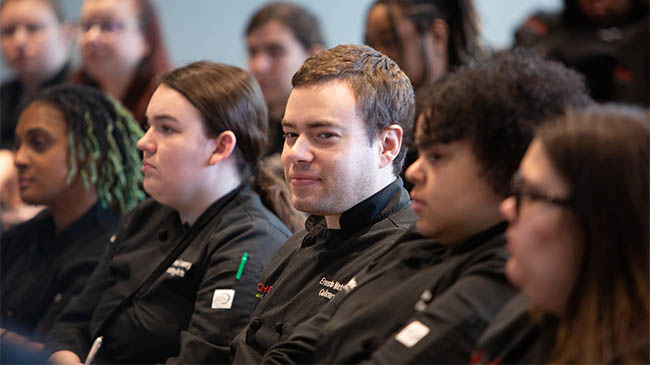
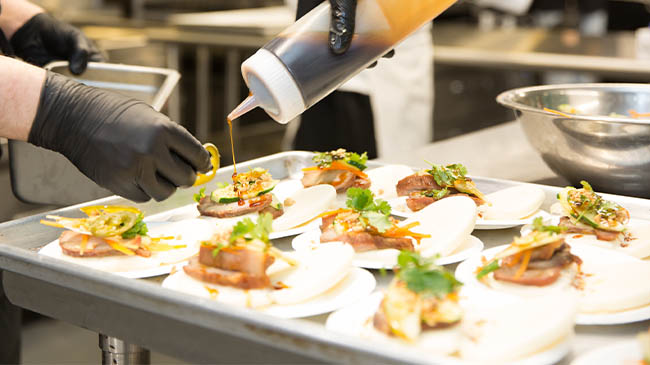
Our program delves deeper into the skills necessary in modern and classical kitchens, exploring intermediate techniques, products, and industry relations. From hands-on sanitation to advanced baking and pastry, our curriculum covers a wide range of culinary disciplines, preparing you for entry and mid-level employment in various culinary and retail career paths.
Never say no if the opportunity is there… You never know whether that volunteer opportunity to work side-by-side with another Chef or an industry expert will set up your next career step.
Chef Ryan Manning
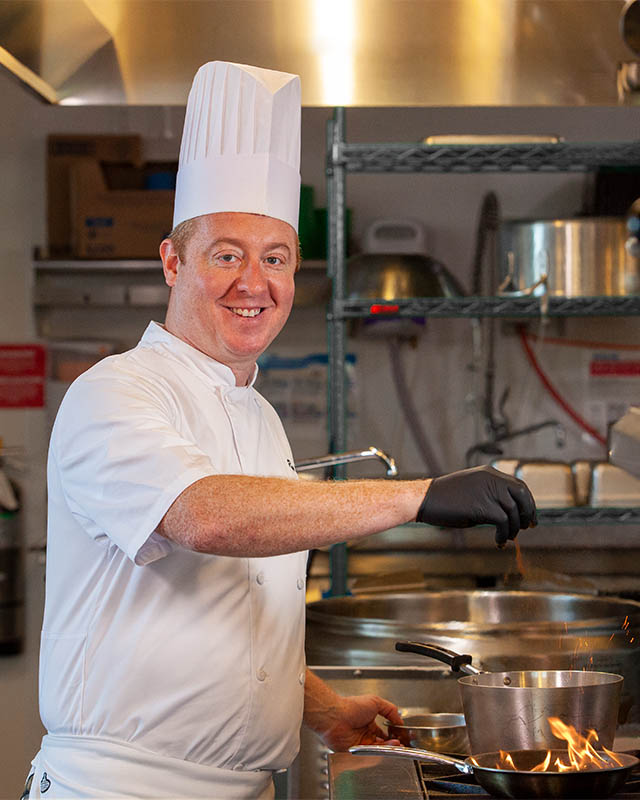
Class Highlights
HRI 219 - Stock, Soup, and Sauce Preparation
Explore the preparation of stocks, soups, and sauces, and to select appropriate uses as meal components.
HRI 220 - Meat, Seafood, and Poultry Preparation
Gain the knowledge and skills required to select and use as meal components, meat, poultry, shellfish, fish, and game, including alternative protein sources.
HRI 281 - Artisan Breads
Study both classical and modern bread baking methods with a focus on craft baking using simple ingredients to create superior products.
Additional Program Information
PURPOSE: The Foundations of Culinary Technique program builds upon existing skill sets by strengthening students’ competencies in both modern and classical kitchens. The curriculum emphasizes hands-on sanitation practices, intermediate cooking techniques, advanced terminology, expanded product knowledge, baking and pastry, food costing and menu design. This credential supports entry- and mid-level employment in various culinary and retail career paths.
OCCUPATIONAL OBJECTIVES: The Foundations of Culinary Technique Career Studies Certificate prepares graduates for employment in roles such as prep cook, station cook, catering staff, line cook, baking and pastry assistant, and other entry- or mid-level culinary positions.
STUDENT LEARNING OUTCOMES:
- Identify and apply benchmark industry standards for operating a safe, sanitary food service operation that meets regional health code standards and fulfills the moral and legal responsibilities of management.
- Integrate culinary knowledge and demonstrate practical skills from across the curriculum in a real-world work setting to illustrate career readiness and employability. (INTERNSHIP)
- Interpret and evaluate culinary knowledge and conduct a skills self-assessment to identify individual weaknesses in order to create a complete repertoire of entry-level culinary arts skills. (CAPSTONE)
- Demonstrate and apply a comprehensive view of the hospitality industry through market research, menu design, product identification and preparation, nutrition standards, effective costing and environmental responsibility at or above industry success rates. (CAPSTONE)
- Identify and engage in various management styles in a variety of roles and scenarios to assess and develop a managerial leadership style.
- Create, evaluate and strategize cost control methods for a successful business operation including cost management, menu engineering, standardization of recipes, variable and fixed costs and income statements through the use of manual and computerized support programs and spreadsheets.
ADMISSION REQUIREMENTS: The Foundations of Culinary Technique Career Studies Certificate requires that students have (1) placed into MTH 130 or higher, or completed MTH 130 or higher, or Department Chair approval; (2) competencies in reading and writing as demonstrated by placement in ENG 111 or completion of a college-level composition course; and (3) completion of the Culinary Fundamentals Career Studies Certificate and/or completion of all pre- or co-requisite courses, or placement through Credit for Prior Learning (also called Credit for Prior Learning/ABLE) with provided documentation submitted to the Department Chair for review for potential test-out opportunities.
PROGRAM NOTES: Faculty provide advising to enhance student success. All students wishing to enroll in a Culinary Arts program must attend an advising session. Once enrolled, students must meet with their advisor each semester to review their scheduling strategy and academic progress toward graduation prior to enrollment. Information about advising and enrolling in classes is available at https://www.reynolds.edu/CulinaryAdvising.
Students who earn a final grade below a C in any CUL, BAK, HRI or the Culinary SDV course must obtain permission from their advisor to continue in the program. Students will be required to repeat courses in their program when grades below a C are earned.
The competency-based nature of the curriculum allows students with previous educational studies, training or experience to be evaluated for advanced standing. Students who believe they are eligible for such consideration must meet with the Department Chair to discuss eligibility for evaluation and possible advanced standing (also called Credit for Prior Learning/ABLE).
REQUIRED UNIFORMS AND TOOL KITS: Students enrolled in Culinary Arts AAS programs or career studies certificates must wear the approved uniform and possess an approved tool kit. Specifications may be obtained at https://www.reynolds.edu/uniforms-for-culinary or from their advisor. All required items are available through the Downtown Campus bookstore and financial aid may be used to assist with obtaining these items.
FINANCIAL REQUIREMENTS: In addition to the regular college tuition and fees, the Culinary Arts AAS programs and career studies certificates require the following:
| Approved uniform items: chef jacket, chef pants, slip resistant black kitchen safety shoes, hat, apron | $225.00 +/- |
| Supplies: medium black Sharpie marker, yellow highlighter, basic pocket calculator, pocket size notebook | $20.00 +/- |
| Textbooks and other supplies | $1500.00 +/- |
| Approved tool kit | $450.00 +/- |
| Major-specific items | See course syllabi |
These costs are approximate, are subject to change without notice, and do not cover transportation costs.
CURRICULUM SEQUENCE: The Flight Path is a curriculum sequence that displays the suggested order in which courses should be completed. Some students may be academically prepared and disciplined enough to earn the Culinary Arts Associate of Applied Science degree in an accelerated manner. Please review the Credit for Prior Learning information and speak with the Department Chair if you believe you may be eligible.
DIETARY EXCEPTION POLICY: While enrolled and participating in all of the program’s laboratory and select lecture courses, students will come into contact with various ingredients, some of which are familiar to them and many that are not. The AAS is aligned with industry standards and expectations that require students to be industry-ready upon completion of the program. The industry expects taste development; therefore, a majority of the program revolves around “tasting as you go” as a standard of higher-level cooking, comprehension and assessment. Without directly participating in tasting, the chances of producing a successful dish — and the overall impact on a student’s grade — are highly compromised. The following areas address these potential concerns:
TASTING: Part of the educational portion of the program is exposure to new ingredients, products and flavor pairings. During required classes, students will participate in tasting activities of foods that include safe-to-eat raw and fresh ingredients, cooked ingredients and fresh, uncooked and cooked dishes. Students are expected to taste all items except those that are documented on file as food restrictions. The process of discerning tastes, flavors, seasonings and “dish needs” is included as part of the grading rubric. Students who do not participate in tasting activities will have their grade adjusted accordingly.
ALLERGIES: The college is committed to student safety. Students with allergy concerns must provide documentation of food allergies from their doctor to be registered and on file with the Office of Student Accommodations. Once documentation is approved, the student will be provided an official accommodations form which must be presented to every instructor for each related course each semester. Students must also provide written instructions outlining the process for assisting them if an issue arises. It is the student’s responsibility to ensure these documents are on file with the Office of Student Accommodations and shared with faculty prior to being needed. In the event that a student opts out of a tasting activity, the instructor will offer a relevant alternative written assignment for the student to complete as a graded substitute.
RELIGION AND RELIGIOUS PRACTICES: Reynolds accepts students of all faiths; however, certain programs contain learning activities that may not align with specific religions or religious practices. The Culinary Arts AAS and its specializations are examples of such programs. Students may choose not to participate in tasting activities if a specific item conflicts with their religious beliefs; however, all efforts should be made to participate when reasonably possible. In the event a student opts out of a tasting activity, the instructor will offer a relevant alternative written assignment for the student to complete as a graded alternative. A second option, referred to as the “Taste and Spit Method,” is also available. Tasting and subsequently spitting allows the student to experience the sensory attributes of the food without actually consuming it. This option satisfies the intended learning benefits of tasting and does not require completion of the alternative written assignment. During the first week of classes, students must inform faculty in writing of any religious restrictions.
RESTRICTIVE AND MEDICAL DIETS: Documented accommodations through the Office of Student Accommodations are intended to provide a safe environment for students. Only documented restrictions that still allow a reasonable ability to complete course and program objectives may be accommodated. Not all requested accommodations may be granted, as students may still be required to complete tasks, recipes or formulas that include the restricted item as part of comprehensive learning. For example, a student with celiac disease who opts out of a tasting activity will be offered a relevant alternative written assignment as a graded substitute.
LIFESTYLE AND ELECTIVE DIETS: While the choice to follow a lifestyle or elective diet is respected, such diets may not always be accommodated within this program. These include but are not limited to vegan, raw only, vegetarian, lacto-ovo, lacto, ovo, pollotarian, pescatarian and flexitarian. Students may choose not to participate in certain tasting activities; however, their grade will reflect these choices. Students may instead use the “Taste and Spit Method.” This allows the student to assess the food’s sensory characteristics without consuming it.
Students with specific concerns or questions should contact the Department Chair or the Office of Student Accommodations.
TECHNICAL STANDARDS: It is understood that any student who is otherwise qualified may be able to use accommodations in order to meet program standards necessary for employment in the culinary industry. Students with an identified disability should contact the Office of Student Accommodations to request reasonable accommodations. Students enrolled in the program must have the ability to perform sufficiently in the following locations and conditions: kitchens, internships, externships, dining rooms, market cafés, laboratories and classroom environments. A list of essential functions, educational and industry standards and related examples is provided at https://www.reynolds.edu/standards.
